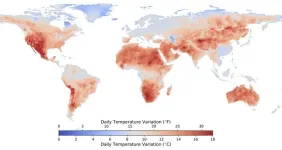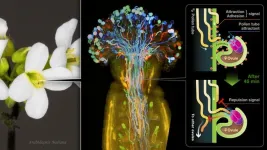(Press-News.org) Extreme heat can harm human health, but so can temperature extreme swings. Large daily temperature variation (DTV) has been associated with elevated mortality in studies around the world. Trees and other vegetation can lower DTV, as trees reduce temperature through transpiration during the day and also trap long-wave radiation in the atmosphere under the canopy at night, increasing temperature. But green space is not equally distributed in most cities. Shengjie Liu and Emily Smith-Greenaway examined inequality in DTV exposure in the US, using monthly nighttime and daytime land surface temperature data from satellites. The authors find that exposure to large DTV differs significantly between White and non-White populations at the census tract level. Specifically, the authors note larger DTV exposure among Black and Hispanic populations, who experience temperature swings of up to 3 degrees Celsius larger than White census tracts. Unequal exposure to DTV is also observed between low-income and high-income populations, though to a lesser degree. The differences in DTV seem to be driven by green space in the urban environment, although the inequalities in this case are larger than the inequalities in experiencing the urban heat island effect, a more well-known consequence of the different urban fabrics that comprise different American neighborhoods. According to the authors, DTV should be considered a fundamental source of climate-induced health disparities.
END
Black and Hispanic Americans experience wider temperature swings
2024-05-21
ELSE PRESS RELEASES FROM THIS DATE:
Gamers say they hate ‘smurfing,’ but admit they do it
2024-05-21
COLUMBUS, Ohio – Online video game players believe the behavior known as “smurfing” is generally wrong and toxic to the gaming community – but most admit to doing it and say some reasons make the behavior less blameworthy, new research finds.
The new study suggests that debates about toxicity in gaming may sometimes be more complex and nuanced than is often acknowledged, according to the researchers.
Online video games use what are called “matchmaking systems” to pair players based on skill. “Smurfing” is when players cheat these systems by creating new accounts so that they can play against people lower ...
How immune cells recognize the abnormal metabolism of cancer cells
2024-05-21
When cells become tumor cells, their metabolism changes fundamentally. Researchers at the University of Basel and the University Hospital Basel have now demonstrated that this change leaves traces that could provide targets for cancer immunotherapies.
Cancer cells function in turbo mode: Their metabolism is programmed for rapid proliferation, whereby their genetic material is also constantly copied and translated into proteins. As researchers led by Professor Gennaro De Libero from the University of Basel and the University ...
How plants mate for life and repel other suitors
2024-05-21
A group of scientists from Nagoya University in Japan has used a specialized microscopic technique to observe the internal reproduction process of the Arabidopsis plant. Their findings, published in EMBO Reports, reveal the mechanism behind a female flower selectively attracting a single male counterpart. These findings provide insights that may help optimize seed production and improve agricultural breeding practices.
Angiosperms, commonly referred to as flowering plants, have male and female reproductive organs. In the process of plant reproduction, when a pollen grain that ...
3D printing robot uses AI machine learning for US Army research
2024-05-21
Inside a lab in Boston University’s College of Engineering, a robot arm drops small, plastic objects into a box placed perfectly on the floor to catch them as they fall. One by one, these tiny structures—feather-light, cylindrical pieces, no bigger than an inch tall—fill the box. Some are red, others blue, purple, green, or black.
Each object is the result of an experiment in robot autonomy. On its own, learning as it goes, the robot is searching for, and trying to make, an object with the most efficient ...
Ruptured Achilles tendon shows faster repair amid plasma irradiation treatment
2024-05-21
What is the largest ligament in the human body? It might surprise some people that it is the Achilles tendon. Even though it is also considered the toughest ligament, the Achilles tendon can rupture, with many such injuries involving sports enthusiasts in their 30s or 40s. Surgery might be required, and a prolonged period of rest, immobilization, and treatment can be difficult to endure.
Seeking to shorten the recovery time, a research team led by Osaka Metropolitan University Graduate School of Medicine’s Katsumasa Nakazawa, a graduate student in the Department of Orthopedic Surgery, Associate Professor ...
Screen time not the main factor making parent-child interactions worse, study finds
2024-05-21
Technology use is at an all-time high and understanding how this impacts daily life is crucial. When it comes to parent-child interactions, scientists have coined the term ‘technoference,’ meaning technology interference. It occurs when parent-child interaction and communication are disrupted by the use of digital devices.
But is distraction caused by digital devices more detrimental to parent-child interaction than when parental distraction comes from different sources? Researchers in Switzerland have investigated.
“In this study, we show that ...
Improving the effectiveness of earthquake early warning systems
2024-05-21
Mobile phones have become invaluable for receiving emergency alerts such as weather warnings, evacuation notices and notifications about missing persons. In Japan, where earthquakes are frequent, they are vital for delivering earthquake warnings and advising people to take protective actions beforehand. To deal with such situations promptly, the Earthquake Early Warning (EEW) system sends out notifications to areas expected to experience strong tremors by detecting primary seismic waves (P-waves) that arrive before the secondary waves (S-waves). However, the short time between receiving the notification and the arrival of S-waves ...
Addressing homelessness in older people
2024-05-21
Homelessness doesn’t only happen to young people but also affects older adults in growing numbers, write authors in an analysis in CMAJ (Canadian Medical Association Journal) that describes this emerging crisishttps://www.cmaj.ca/lookup/doi/10.1503/cmaj.231493.
People experiencing homelessness are considered older adults at age 50, as visible aging is often evident at younger ages in individuals experiencing homelessness compared with individuals who have secure housing. Individuals experiencing homelessness often develop chronic ...
One in 5 adults in Canada without access to primary care
2024-05-21
More than 1 in 5 adults in Canada did not have access to primary care, with large regional gaps in access, found new research in CMAJ (Canadian Medical Association Journal) https://www.cmaj.ca/lookup/doi/10.1503/cmaj.231372.
“Translated to the population of Canada, our survey estimates that more than 6.5 million adults across the country don’t have access to a family doctor or nurse practitioner they can see regularly,” says Dr. Tara Kiran, a family physician and researcher at the MAP Centre for Urban Health Solutions at St. Michael’s Hospital, Unity Health Toronto and the University ...
Studies on risks of weight-loss drugs and more presented at Digestive Disease Week
2024-05-21
Washington (May 14, 2024) — Studies examining the risks of GLP-1 weight-loss drugs, distinguishing alpha-gal syndrome from other GI disorders, and comparing medications to slow the progression of liver disease in patients with alcohol-use disorder will be presented this week at Digestive Disease Week (DDW) 2024. Abstracts are available to registered media. Embargos lift at 12:01 a.m. EDT on the day they are presented.
Here are summaries of the new research:
Re-examining the risks of gastrointestinal adverse events associated with glucagon-like peptide-1 receptor agonists for weight loss with more stringent criteria on a comprehensive ...





